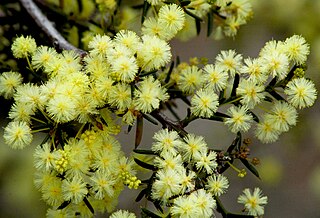
Acacia complanata, known as long-pod wattle and flat-stemmed wattle, is a perennial tree native to eastern Australia.

Acacia longifolia is a species of Acacia native to southeastern Australia, from the extreme southeast of Queensland, eastern New South Wales, eastern and southern Victoria, and southeastern South Australia. Common names for it include long-leaved wattle, acacia trinervis, aroma doble, golden wattle, coast wattle, sallow wattle and Sydney golden wattle. It is not listed as being a threatened species, and is considered invasive in Portugal and South Africa. In the southern region of Western Australia, it has become naturalised and has been classed as a weed by out-competing indigenous species. It is a tree that grows very quickly reaching 7–10 m in five to six years.

Acacia acinacea, commonly known as gold dust wattle, is a flowering shrub. It is native to south eastern Australia and lives for 15 years on average. They are tolerant of drought and frost. It is a species of wattle, and is also known as wreath wattle or round-leaf wattle.

Acacia neriifolia, also known as the oleander wattle, silver wattle or pechy wattle, is a tree in the genus Acacia native to north eastern Australia. It is common in the Moonbi Ranges.

Acacia genistifolia, commonly known as spreading wattle or early wattle is a species of Acacia in the family Fabaceae that is native to south eastern Australia.

Acacia brownii, commonly known as heath wattle, is an erect or spreading shrub which is endemic to eastern Australia.

Acacia flexifolia, commonly known as bent-leaf wattle or small winter wattle, is a shrub species that is endemic to eastern Australia.

Acacia linifolia, known colloquially as white wattle, or flax wattle, is a species of Acacia native to eastern Australia.

Acacia georgensis, commonly known as Bega wattle or Dr George Mountain wattle, is a species of Acacia native to southeastern Australia. It was one of eleven species selected for the Save a Species Walk campaign in April 2016 when scientists walked 300 km to raise money for collection of seeds to be prepared and stored at the Australian PlantBank at the Australian Botanic Garden Mount Annan.

Acacia aculeatissima, commonly known as thin-leaf wattle or snake wattle, is a shrub belonging to the genus Acacia and the subgenus Phyllodineae that is native to parts of eastern Australia.

Acacia conferta, commonly known as crowded-leaf wattle, is a shrub belonging to the genus Acacia and the subgenus Phyllodineae that is endemic to eastern Australia.

Acacia hamiltoniana, commonly known as Hamilton's wattle, is a shrub belonging to the genus Acacia and the subgenus Phyllodineae that is native to parts of eastern Australia.

Acacia juncifolia, commonly known as rush-leaf wattle, is a shrub or tree belonging to the genus Acacia and the subgenus Phyllodineae that is endemic to north eastern Australia.
Acacia nova-anglica, commonly known as New England hickory, is a shrub belonging to the genus Acacia and the subgenus Phyllodineae that is endemic to eastern Australia.

Acacia obtusata, commonly known as blunt-leaf wattle or obtuse wattle, is a tree or shrub belonging to the genus Acacia and the subgenus Phyllodineae native to eastern Australia.

Acacia linearifolia, commonly known as stringybark wattle or narrow-leaved wattle, is a shrub or tree of the genus Acacia and the subgenus Phyllodineae that is endemic to eastern Australia.

Acacia caroleae, also known as Carol's wattle or narrow leaf currawong, is a shrub belonging to the genus Acacia and the subgenus Juliflorae that is native to north eastern Australia.

Acacia rhigiophylla, commonly known as dagger-leaf wattle, is a shrub belonging to the genus Acacia and the subgenus Juliflorae that is native to southern Australia.

Acacia elongata, also known as swamp wattle or slender wattle, is a shrub of the genus Acacia and the subgenus Plurinerves that is endemic to coastal areas of eastern Australia.

Acacia subporosa, also commonly known as river wattle, bower wattle, narrow-leaf bower wattle and sticky bower wattle, is a tree or shrub of the genus Acacia and the subgenus Plurinerves that is endemic to an area of south eastern Australia. It is considered to be rare in Victoria



















